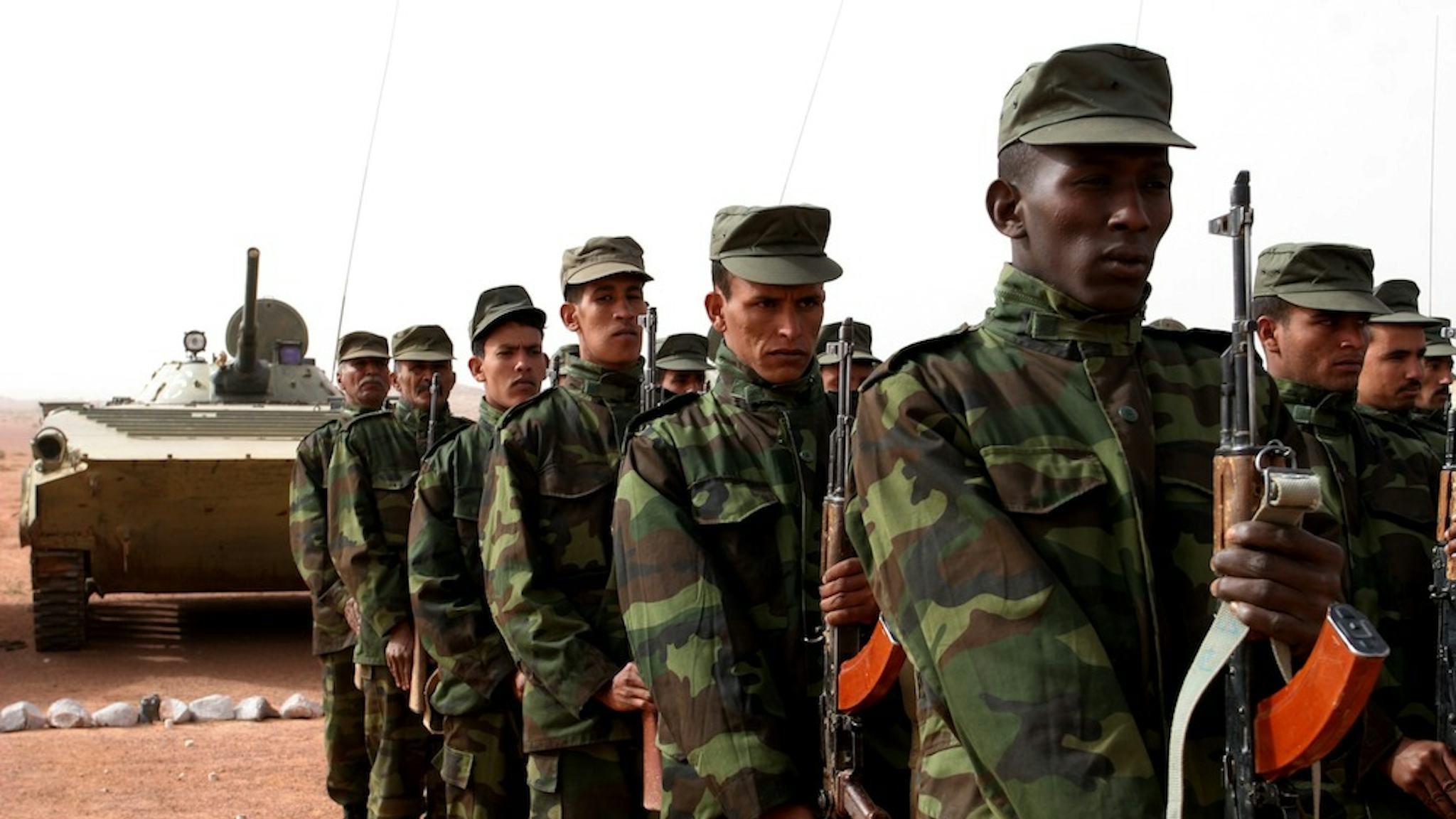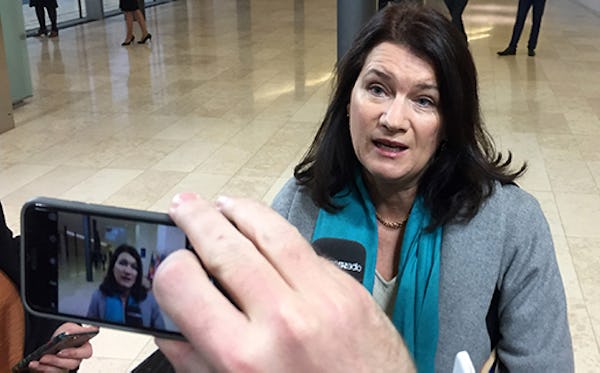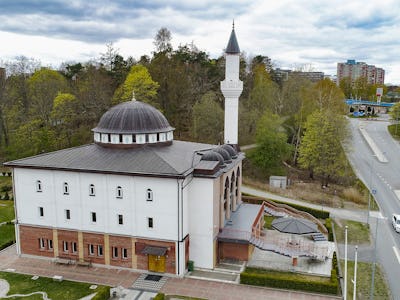Dubious Swedish Involvement in Occupied Western Sahara
Swedish businesses are involved in breaking international laws through activities in the occupied Western Sahara. Emmaus Stockhom and other organisations criticize the Swedish government in not doing enough to stop them.

Some 2,500 Polisario troops parade to commemorate the 33rd anniversary of the declaration of the Saharawi Republic by the Polisario Front, a rebel movement that refuses Morocco’s annexation of the territory, in Akhshash, Western Sahara.
“The people of Western Sahara are being manipulated” says Julia Finér, spokesperson for Emmaus Stockholm. Swedish firms have been active in the occupied territory for several years. Travel companies have been doing business there, as have Atlas Copco, the shipping company Wisby Tankers and the fishing company Fiskebäck.
ALSO READ – Western Sahara’s locked positions might be loosening
In December of last year, the Court of Justice of the EU established the rights of the people of Western Sahara to have a say in business deals that involved West Saharian interests.
The conflict in Western Sahara is decades old. In the mid-1970s Spain left its colony (Spanish Sahara) which then was invaded and occupied by Morocco.
The liberation army Polisario was formed to fight for independence, a struggle that continues today. Sweden has never recognized Western Sahara as an independent country, unlike more than 80 other countries.
To do business there though requires particular conditions being met. Julia Finér explains:
“According to the decision of the Court of Justice of the EU last December, when commercial activities involve Western Saharian interests, a kind of consent must be attained from the people of Western Saharian.
Furthermore the ruling states that the liberation army Polisario is the recognized legitimate representative to the United Nations”
Recently the Western Sahara Resource Watch, a collaboration between Emmaus Stockholm and several NGOs,published the report “Sweden and the Plunder of Western Sahara”
According to Emmaus Stockholm, the EU does not respect the ruling of the Court of Justice. The key difference being that the European Council does not consider Polisario unequivocally the representative of the people of Western Sahara.
“The European commission is active in reworking the interpretation of the ruling concerning the issue of legitimate representatives” claims Julia Finér, who goes on to state that this is going on at the same time that Morocco is plundering the occupied territory along with repressing with arbitrary arrests and torture.
In Sweden the occupation has been given increased attention.
The Swedish parliament instructed the government earlier this year, to force provisions into the EU-Morocco trade deal that would include the people of Western Sahara in the upcoming trade negotiations.
Despite this measure, the Swedish government has come under criticism for not doing enough to ensure that the Court’s ruling is understood and adhered to by business interests and in commercial activities.
“We want the government to make an official statement directed at trade organisations and Swedish companies to avoid activities in Western Sahara until the political situation has been solved” says Julia Finér.
This has already been done in Norway, Denmark and the Netherlands.
“Sweden should follow suit. The Foreign Department have recommendations for Israel and Palestine which could be transferred onto the Western Sahara case”
The Swedish industrial corporation Atlas Copco refute the criticism of their involvement and interpret the Court’s ruling in a very different way. “The ruling has nothing to do with our sales either to Morocco or in Morocco” claims Ola Kinnander, press officer at Atlas Copco.
“In 2008 we sold three drilling rigs to a Moroccan company, and they are used in Western Sahara. Today, we have a contract for maintenance of them”. He adds that since 2008 no equipment has been sold to the territory.
The report also criticizes the Swedish AP pension funds.
Several of the funds invest in Swedish and foreign businesses that are commercially active in Western Sahara. Tobias Fransson, Head of Alternative Investments at AP funds and in charge of strategy and sustainability issues, can confirm investments in Atlas Copco of around 4 billion Swedish crowns (refuting the 9.2 billion as claimed in the report).
Gert Lundstedt
* The report was a collaboration between 6 Swedish NGOs: Emmaus Stockholm, Emmaus Gävleborgs Biståndsgrupp, Brödet & Fiskarna, Svenska Västsaharakommittén, Tidskriften Västsahara and Kommittén för Västsaharas kvinnor.
”Absence of information”

Ann Linde.
The Swedish government has come under criticism for an absence of information directed at Swedish companies active in Western Sahara. Arbetet Global posed some questions to Ann Linde, Minister of EU Affairs and Trade .
What guidance does the Swedish government give to Swedish companies in interpreting the ruling made by the EU Court?
“The Court’s ruling did not deal with the issue of how individual member states support or offer protection to business, and therefore there is no direction of how to guide Swedish businesses that are active in Western Sahara.
Shouldn’t the government follow the examples of Norway, Denmark and the Netherlands who do offer such guidance?
“In 2015 Sweden set out a plan of action for business and human rights which addresses the guiding principle set by the UN regarding practical action on a national level. The plan of action is part of the government’s interactions with the business sphere, and has been widely recognized, thus forms guidelines for the Swedish companies that want to trade or invest in Western Sahara.”
Minster of EU Affairs and Trade Ann Linde adds that, this summer, the government gave the Swedish Agency for Public Management the task of appraising Sweden’s adherence to the guiding principles for businesses and human rights.
“I need to know if there are legal problems and shortcomings in Swedish law and if enough has been done to accord with the UN guiding principles”
Ann Linde expresses her hopes that the Agency of Public Management can answer if enough has been done to support the companies’ own efforts to protect human rights in their commercial activities.
Facts: Western Sahara
Western Sahara is a territory on the Atlantic Coast of Africa. South of Morocco and northwest of Mauritania. Once a Spanish colony, it was determined in 1975 by the United Nations to be a territory that belonged to the people of Western Sahara, and no other country. That same year, Morocco occupied most of the territory.
In 2016 Morocco expelled the civilian UN presence in Western Sahara due to statements made by the UN General Secretary that the Moroccan presence was an occupation of Western Sahara.
Later in 2016, the Court of Justice of the European Union stipulated that Moroccan interests were not equivalent to Western Saharian interests. This meant that the EU-Morocco trade deal would not include the occupied territory as it was separate and not part of Morocco.
The European Commission has requested a renewed mandate to negotiate with Morocco in order to renew the trade agreement between the EU and Morocco.
Source: TT








